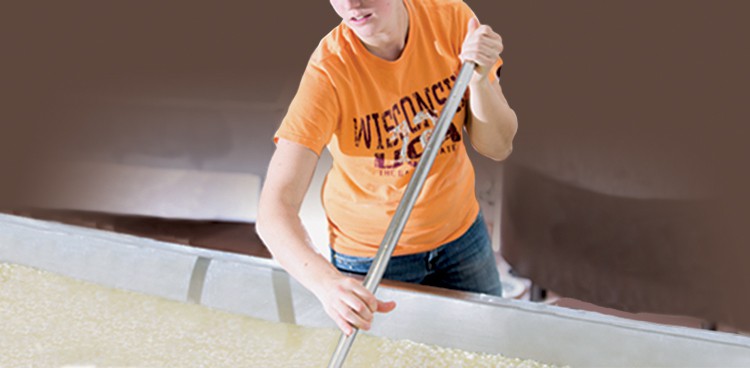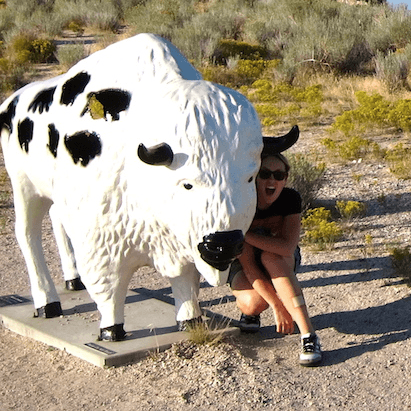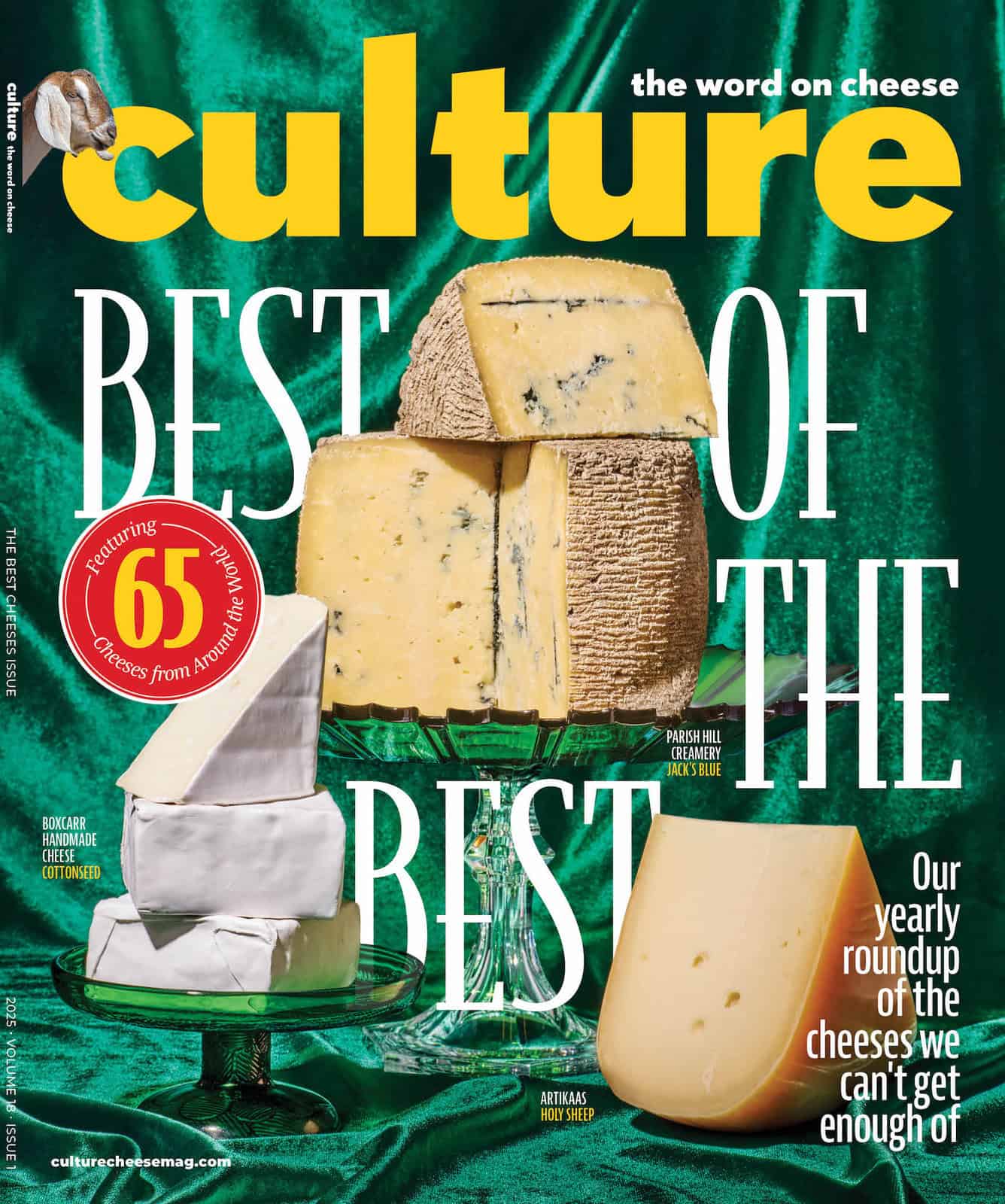
Joshua Querl looks back on his college days at Oregon State University with golden-hued nostalgia: mentorships with professors, athletics at the rec center, concerts at the student union, and… cheesemaking.
“I remember wrapping wooden boxes filled with cheese—one going to the CEO of the company that I currently work for,” says Querl, a 2012 OSU food science graduate and now a quality manager for Darigold, a Sunnyside, Wash.-based dairy cooperative. Querl was the first student to work in OSU’s dairy pilot plant, which produces award-winning Beaver Classic artisan cheese.
The nutty, washed-rind alpine-style is sold in campus stores and at the local farmers’ market; cheese curds are ubiquitous during OSU football games. Reminiscent of Comté, nine-month-aged Beaver Classic has become so popular that all Oregon Costco stores now stock it, requiring the creamery to boost production. In 2011 the creamery made three wheels per week; today it makes 40. Students do it all: sanitize equipment; cut curds; wash wheels; take inventory; and package, market, and sell their product. They also create mozzarella-textured Parker’s Peak — an unwashed young Beaver Classic — and, soon, Swiss.
“Remember the months you make cheese,” creamery and cheese plant manager Robin Frojen tells her College of Agricultural Sciences apprentices, “because you’ll know when yours is out there in the real world.”
OSU isn’t the only school giving young dairy artisans a head start; campus creameries from New York to Washington are educating a steady stream of students — pursuing degrees in various fields — in cheesemaking. Often graduates take their newly acquired skills and passion directly into the industry.
Washington State University is perhaps the grandfather of this trend, known for manufacturing canned Cougar Gold white cheddar with the help of student employees since the 1930s. (In fact, the WSU creamery leader was tapped to help relaunch the OSU plant, which had been dormant for nearly 50 years.)
At the University of Wisconsin–River Falls, Amy Kringle clocked dozens of hours in the dairy pilot plant and even obtained her pasteurization certification before she graduated in May 2014. She hadn’t intended to pursue cheesemaking; she’d grown up on a dairy farm and had hoped to explore other careers. But an internship at a green bean processing plant before her junior year led to a change of heart.
“I was so discouraged,” Kringle recalls. “I didn’t know if I wanted to do food science anymore. Then we made cheese, and I thought, ‘Yeah, this is what I wanna do!’”
Established in 1983, the UWRF creamery produces signature Cobblestone Red, a sweet semi-soft cheese handcrafted in 200-pound batches using milk from the school’s herd of 80 Holstein cows and washed with local dessert wine. When wheels first went on sale in 2007, campus shops promptly sold out.
Now the student-employed plant turns out 13,500 pounds of 18 kinds of cheese, including Signature No. 18, a cocoa-infused white cheddar named for the university’s 18th (and current) chancellor. Experimental styles include Havarti and gouda. The Wisconsin Cheese Makers Association has noticed and is donating $100,000 toward the plant’s 2015 expansion. (The small facility churns ice cream primarily, limiting cheesemaking to three days per week.)
“I expect double or triple in enrollment in programs,” says UWRF dairy pilot plant manager Michelle Farner, who oversaw production last summer — the first time production occurred over the summer, in order to ensure enough cheese inventory for autumn farmers’ markets. “Our store will quadruple in size.”
Ice cream also reigns at Michigan State University’s creamery, built in 1929. But MSU also sells about 40,000 pounds of cheese annually. Forty students work in the dairy plant, with about a third focused on cheese: 10 styles, including cult-classic cheddar and Edam-style Dagano. Most varieties are sold in shops and online.
On a smaller scale Cornell University unveiled its six-month-aged Big Red Cheddar, handmade with milk from the school’s dairy farm, on Halloween in 2012. Four food science majors assist Dairy Extension associate and alumnus Rob Ralyea in the food production and research laboratory, which simultaneously processes cottage cheese, yogurt, milk, and ice cream.
At first only 30 two-pound wheels of Big Red Cheddar were made at a time. But “we outgrew our equipment in short order,” Ralyea says. A new manual cheese press now accommodates 88 wheels at once — good news, since demand is high. Cornell eateries serve approximately 2,400 pounds of Big Red Cheddar per year; the rest is sold at campus stores and online. As of publication time, the creamery was planning to release AD White Cheddar, a smooth, mellow wheel named for a Cornell founder.
“It’s an amazing position we’re in to really give these kids a head start,” says OSU’s Frojen. “The dairy industry is gonna change quite a bit.”
Want to buy some of the cheeses mentioned above? Here’s where you can find them.
Oregon State University – Locals can buy nutty Beaver Classic cheese at all Oregon Costco stores, Corvallis Farmers Market and at all home OSU football games. Or, when temperatures permit safe shipping, order online.
Washington State University – Cougar Gold, the classic canned cheddar, is available online, along with other sundries, including cookbooks and a piggy bank fashioned from their unique packaging.
University of Wisconsin–River Falls – Nearby curd nerds can buy any of UWRF’s 18 cheeses on campus at the Falcon Foods Store. Select cheeses can be shipped when ordered online.
Michigan State University – Two on-campus locations stock a wide variety of MSU, but you can order from a smaller selection online, where sampler packs—and even cheesy fudge—are offered.
Cornell University – Available at campus retail locations and eateries, Big Red Cheddar is also sold online in 2-pound wheels. A portion of sale proceeds go to the university’s Food Science program.






